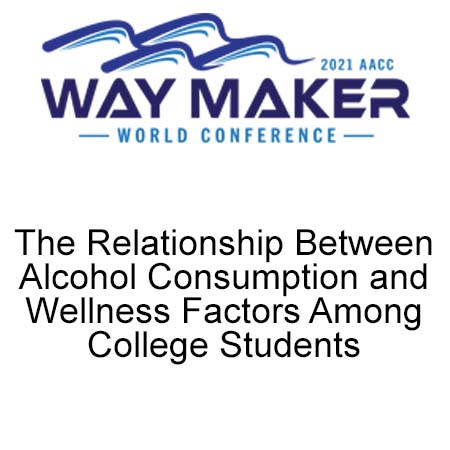Description
319: The Relationship Between Alcohol Consumption and Wellness Factors Among College Students
Angel Golson, Ph.D.
Liberty University
1971 University Blvd.
Lynchburg, VA 24515
Capri Brooks, Ph.D.
Liberty University
1971 University Blvd.
Lynchburg, VA 24515
Summary
Despite administrators’ and counselors’ efforts to educate, motivate, and promote positive lifestyle changes, emerging adults continue to drink alcohol and participate in risky behaviors due to drinking. These behaviors result in physical, legal, and academic consequences (Hingson et al., 2009; Johnston et al., 2007; NIAAA, 2006; Wechsler et al., 2002). Therefore, college administrators strive to develop wellness programs addressing issues with alcohol facing college students (Myers & Sweeney, 2005), and counselors work to provide interventions to help those with alcohol-related problems. The research study presented evaluated the relationship between wellness factors and alcohol consumption and alcohol-related behaviors. The results supported that wellness factors based on the Indivisible Self model of wellness (Myers & Sweeney, 2004) can predict alcohol consumption and behaviors related to alcohol. In addition, the results concluded that several wellness factors need to be incorporated in the development of college programs and stressed the importance of assessing and providing emerging adults with wellness programs based on the mind, body, and spirit perspective. Treating only selective parts of an individual’s life tasks does not envision how he or she moves in his or her development in a purposeful manner. The study results provided information that reinforced the importance of addressing college student drinking from a holistic approach. Using this valuable information, college administrators will know more information about where and how to guide resources for program development. Also, counselors will be better able to understand the strengths and challenges college students face. These findings point out that the incorporation of the mind, body, and spirit moving purposefully can decrease the likelihood of alcohol consumption and behaviors related to alcohol among college students (Myers et al., 2000).
Learning Objectives
Participants will:
• Identify variables of wellness that impact emerging adults’ decisions about alcohol consumption and behaviors related to alcohol
• Apply information to be used in developing more appropriate interventions using a holistic approach for emerging adults with issues concerning alcohol for addiction counselors and licensed mental health professionals
• Discuss strategies to enhance sound quality relationships among emerging adults, especially for those students struggling with alcohol





